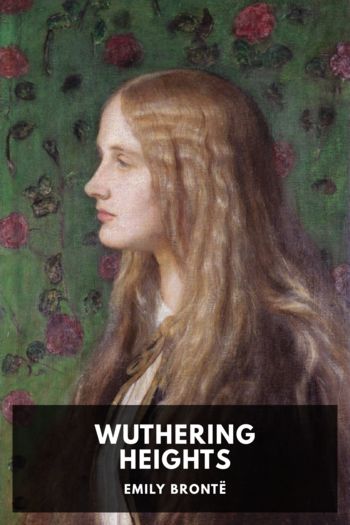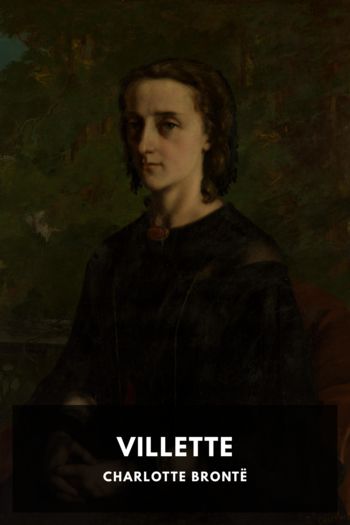Shirley by Charlotte Brontë (best books to read for teens .TXT) 📕

- Author: Charlotte Brontë
Book online «Shirley by Charlotte Brontë (best books to read for teens .TXT) 📕». Author Charlotte Brontë
By Charlotte Brontë.
Table of Contents Titlepage Imprint I: Levitical II: The Wagons III: Mr. Yorke IV: Mr. Yorke (Continued) V: Hollow’s Cottage VI: Coriolanus VII: The Curates at Tea VIII: Noah and Moses IX: Briarmains X: Old Maids XI: Fieldhead XII: Shirley and Caroline XIII: Further Communications on Business XIV: Shirley Seeks to Be Saved by Works XV: Mr. Donne’s Exodus XVI: Whitsuntide XVII: The School Feast XVIII: Which the Genteel Reader Is Recommended to Skip, Low Persons Being Here Introduced XIX: A Summer Night XX: Tomorrow XXI: Mrs. Pryor XXII: Two Lives XXIII: An Evening Out XXIV: The Valley of the Shadow of Death XXV: The West Wind Blows XXVI: Old Copybooks XXVII: The First Bluestocking XXVIII: Phoebe XXIX: Louis Moore XXX: Rushedge—A Confessional XXXI: Uncle and Niece XXXII: The Schoolboy and the Wood-Nymph XXXIII: Martin’s Tactics XXXIV: Case of Domestic Persecution—Remarkable Instance of Pious Perseverance in the Discharge of Religious Duties XXXV: Wherein Matters Make Some Progress, but Not Much XXXVI: Written in the Schoolroom XXXVII: The Winding-Up Endnotes Colophon Uncopyright ImprintThis ebook is the product of many hours of hard work by volunteers for Standard Ebooks, and builds on the hard work of other literature lovers made possible by the public domain.
This particular ebook is based on a transcription produced for Project Gutenberg and on digital scans available at the Internet Archive.
The writing and artwork within are believed to be in the U.S. public domain, and Standard Ebooks releases this ebook edition under the terms in the CC0 1.0 Universal Public Domain Dedication. For full license information, see the Uncopyright at the end of this ebook.
Standard Ebooks is a volunteer-driven project that produces ebook editions of public domain literature using modern typography, technology, and editorial standards, and distributes them free of cost. You can download this and other ebooks carefully produced for true book lovers at standardebooks.org.
I LeviticalOf late years an abundant shower of curates has fallen upon the north of England: they lie very thick on the hills; every parish has one or more of them; they are young enough to be very active, and ought to be doing a great deal of good. But not of late years are we about to speak; we are going back to the beginning of this century: late years—present years are dusty, sunburnt, hot, arid; we will evade the noon, forget it in siesta, pass the midday in slumber, and dream of dawn.
If you think, from this prelude, that anything like a romance is preparing for you, reader, you never were more mistaken. Do you anticipate sentiment, and poetry, and reverie? Do you expect passion, and stimulus, and melodrama? Calm your expectations; reduce them to a lowly standard. Something real, cool, and solid lies before you; something unromantic as Monday morning, when all who have work wake with the consciousness that they must rise and betake themselves thereto. It is not positively affirmed that you shall not have a taste of the exciting, perhaps towards the middle and close of the meal, but it is resolved that the first dish set upon the table shall be one that a Catholic—ay, even an Anglo-Catholic—might eat on Good Friday in Passion Week: it shall be cold lentils and vinegar without oil; it shall be unleavened bread with bitter herbs, and no roast lamb.
Of late years, I say, an abundant shower of curates has fallen upon the north of England; but in eighteen-hundred-eleven-twelve that affluent rain had not descended. Curates were scarce then: there was no Pastoral Aid—no Additional Curates’ Society to stretch a helping hand to worn-out old rectors and incumbents, and give them the wherewithal to pay a vigorous young colleague from Oxford or Cambridge. The present successors of the apostles, disciples of Dr. Pusey and tools of the Propaganda, were at that time being hatched under cradle-blankets, or undergoing regeneration by nursery-baptism in wash-hand basins. You could not have guessed by looking at any one of them that the Italian-ironed double frills of its net-cap surrounded the brows of a preordained, specially-sanctified successor of St. Paul, St. Peter, or St. John; nor could you have foreseen in the folds of its long nightgown the white surplice in which it was hereafter cruelly to exercise the souls of its parishioners, and strangely to nonplus its old-fashioned vicar by flourishing aloft in a pulpit the shirt-like raiment which had never before waved higher than the reading-desk.
Yet even in those days of scarcity there were curates: the precious plant was rare, but it might be found. A certain favoured district in the West Riding of Yorkshire could boast three rods of Aaron blossoming within a circuit of twenty miles. You shall see them, reader. Step into this neat garden-house on the skirts of Whinbury, walk forward into the little parlour. There they are at dinner. Allow me to introduce them to you: Mr. Donne, curate of Whinbury; Mr. Malone, curate of Briarfield; Mr. Sweeting, curate of Nunnely. These are Mr. Donne’s lodgings, being the habitation of one John Gale, a small clothier. Mr. Donne has kindly invited his brethren to regale with him. You and I will join the party, see what is to be seen, and hear what is to be heard. At present, however, they are only eating; and while they eat we will talk aside.
These gentlemen are in the bloom of youth; they possess all the activity of that interesting age—an activity which their moping old vicars would fain turn into the channel of their pastoral duties, often expressing a wish to see it expended in a diligent superintendence of the schools, and in frequent visits to the





Comments (0)